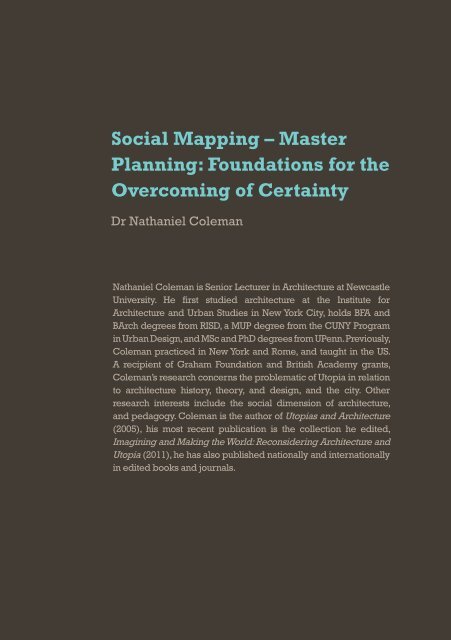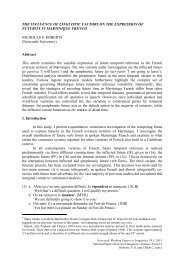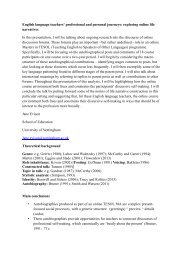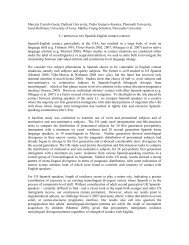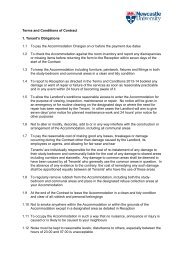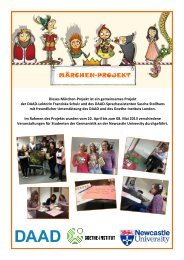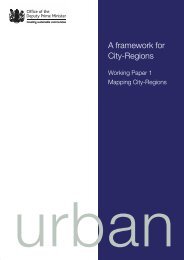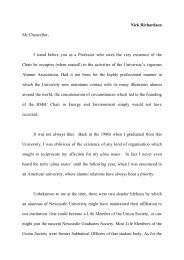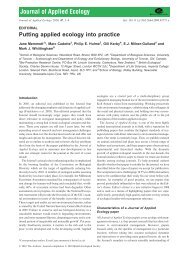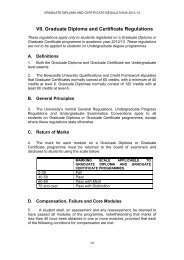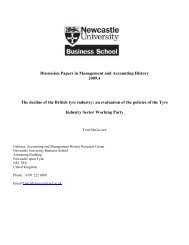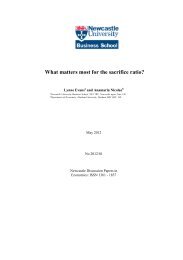APL Design Yearbook 2010-11 - Newcastle University
APL Design Yearbook 2010-11 - Newcastle University
APL Design Yearbook 2010-11 - Newcastle University
Create successful ePaper yourself
Turn your PDF publications into a flip-book with our unique Google optimized e-Paper software.
Social Mapping – Master<br />
Planning: Foundations for the<br />
Overcoming of Certainty<br />
Dr Nathaniel Coleman<br />
Nathaniel Coleman is Senior Lecturer in Architecture at <strong>Newcastle</strong><br />
<strong>University</strong>. He first studied architecture at the Institute for<br />
Architecture and Urban Studies in New York City, holds BFA and<br />
BArch degrees from RISD, a MUP degree from the CUNY Program<br />
in Urban <strong>Design</strong>, and MSc and PhD degrees from UPenn. Previously,<br />
Coleman practiced in New York and Rome, and taught in the US.<br />
A recipient of Graham Foundation and British Academy grants,<br />
Coleman’s research concerns the problematic of Utopia in relation<br />
to architecture history, theory, and design, and the city. Other<br />
research interests include the social dimension of architecture,<br />
and pedagogy. Coleman is the author of Utopias and Architecture<br />
(2005), his most recent publication is the collection he edited,<br />
Imagining and Making the World: Reconsidering Architecture and<br />
Utopia (20<strong>11</strong>), he has also published nationally and internationally<br />
in edited books and journals.<br />
Although ‘Social Mapping’ and ‘Master<br />
Planning’ may conjure up anxieties linked<br />
to the excesses of orthodox modern<br />
architecture and planning, the persisting<br />
value of both for imagining the just city<br />
is advanced here, albeit in potentially<br />
surprising ways, and in relation to Utopia.<br />
Social Mapping – Master Planning:<br />
Foundations for the Overcoming of<br />
Certainty<br />
Social Mapping and Master Planning<br />
are phrases that at first glance suggest<br />
something authoritarian, at the very least<br />
top-down, and perhaps even panoptic<br />
in their sweep. Under current conditions<br />
both are at best anomalous and at worst<br />
retrograde: how can you map the social<br />
and who (or whom) could have the nerve<br />
to claim for themselves the title of master<br />
of the plan? And yet, the antithesis of social<br />
mapping and master planning, in lieu of<br />
the autogestion Henri Lefebvre envisioned,<br />
which the distorting myths of some Big<br />
Society seem only to place at an ever<br />
further remove (as a kind of pathological<br />
utopia akin to Disney World), architects,<br />
planners and urban designers must<br />
continue to find ways to imagine futures<br />
for neighbourhoods, villages, towns, and<br />
cities that do not descend into the anarchic<br />
narcissism of absent planning controls and<br />
radically free-markets (or the determinism<br />
of the immediate post-war period).<br />
Feature / Dr Nathaniel Coleman 139<br />
So, there it is: in this instance, Social<br />
Mapping and Master Planning have been<br />
turned on their heads. Apart from the<br />
linguistic (or other forms of) gymnastics this<br />
suggests, the intention is radical. Under<br />
the cover of a dubious self-proclaimed<br />
progressiveness, prophets of nothingness<br />
suggest that there is a correlation between<br />
anti-planning, that is its abdication, and<br />
the provision of settings invented by their<br />
users. Long ago such perspectives were<br />
called into question during the epoch of<br />
abstract orthodox modernist architecture<br />
and planning, with their obsession for the<br />
generalized, not to say generic, and the<br />
abstract. The paradox remains, individual<br />
and group appropriation (individual and<br />
social imagination even) are nourished<br />
by carefully defined settings, made up of<br />
articulate elements that establish a field<br />
of appropriation as much as of response.<br />
And here I am reluctant to name adherents<br />
of either faction, the non-definers and<br />
definers alike, not least because I wish<br />
to remain focused on the theoretical<br />
aims of this essay but also because I<br />
would like to avoid sidelining readers into<br />
discussions around what they do or do not<br />
like. However, this evasiveness is not just<br />
self-serving in its apparent cowardice; its<br />
primary aim is to be generative, in just the<br />
ways Social Mapping and Master Planning<br />
suggest impossible thought experiments<br />
that are nonetheless possible.


